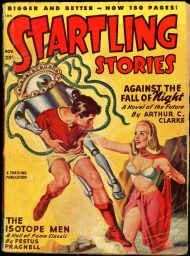Audaciously Weird: my favorite kind of SF story
Tuesday , 11, April 2017 Short Fiction, Uncategorized 12 CommentsYou know the type. It’s the kind of story that takes a crazy, dream-logic premise and runs with it. The most famous example is “Scanners Live in Vain” by Cordwainer Smith. “Martel was angry. He did not even adjust his blood away from anger.”
And then there’s “Humpty Dumpty Had a Great Fall” by Frank Belknap Long. It was published in 1948, five years after “Mimsy Were the Borogroves” by Lewis Padgett, which it resembles, but surpasses for sheer weirdness. The premise is that the Mother Goose nursery rhymes were inspired by a vision of a pocket universe inhabited by bizarre, cryptic, inexplicable clockwork creatures, who engage in an endlessly repeated cycle of cruelty and violence. As a young reader, it introduced me to the idea that parallel universes might operate by their own laws of physics and logic. (And it wasn’t even the cover story!)
The third example is a story whose name I can’t recall, but I’m pretty sure it was by A.E. van Vogt. It’s about a cabal of supermen who keep their organs separate from their bodies, in elaborate life-support chambers. Why do they do this? Because it allows them to control a mysterious form of energy that is the source of their powers. It’s a familiar concept in folklore (The Golden Bough has a whole chapter on “The External Soul”). The story replaces the magical explanation with a scientific one, and make it more weird in the process.
This kind of story seems to belong exclusively to the late pulp era. It requires a certain primitive, naive, un-self-conscious energy to pull it off. There’s nothing like it after 1955 or so. How the heck do you write this kind of story in 2017? I’ve gotten close a few times by using images and phrases that came to me in dreams.
I’ll post more examples as I think of them. Feel free to add your own in the comments. If anyone knows the name of the third story, please post it.
I think George Alec Effinger, Robert Sheckley, Harlan Ellison, Avram Davidson, and Philip Dick (off the top of my head) all specialized in those sorts of stories, if I understand your meaning. In fact, I associate the “audaciously weird” much more with the New Wave era than with Pulp.
-
Yeah, my first thought was “Oh, Philip K. Dick”.
Borogoves, not ‘Borogroves’.
A slight off-topic, but Lewis Padgett is a known pseudonym of Henry Kuttner and C. L. Moore, some of the few authors to make the leap from Weird Tales to Astounding.
“How the heck do you write this kind of story in 2017?”
According to the Beatles . . .
Look for the girl with the sun in her eyes
And she’s gone
Lucy in the sky with diamonds
-
According to Jefferson Airplane . . .
When the men on the chessboard
Get up and tell you where to go
And you’ve just had some kind of mushroom
And your mind is moving low
Go ask Alice
I think she’ll know
According to Cordwainer himself . . .
[Under Old Earth, section 8 (1966)]
“He triple-thought.
Only a few very adept persons could triple-think, when they were given every possible chance of training. Fortunately for mankind, the Lord Sto Odin had been one of the successful ones.
He set three systems of thought into action.”
You need some Lafferty in your life.
